高一英语必修一第一单元知识点和语法点
高一英语必修一语法归纳
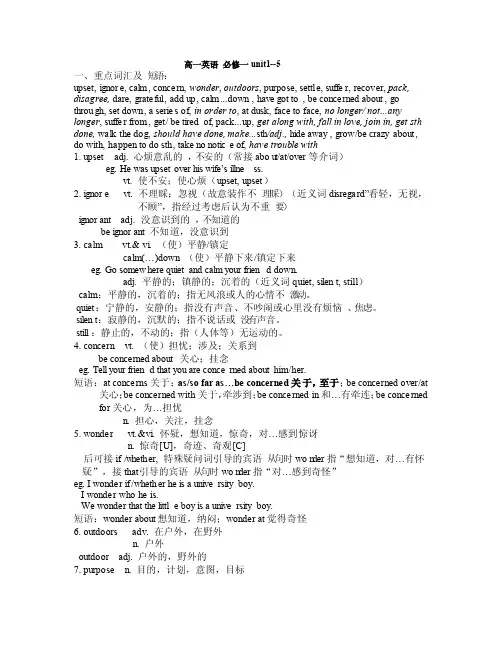
高一英语必修一 unit1--5一、重点词汇及短语:upset, ignore, calm, concer n, wonder, outdoo rs, purpos e, settle, suffer, recove r, pack, disagr ee, dare, gratef ul, add up, calm...down , have got to , be concer ned about, gothroug h, set down, a series of, in orderto, at dusk, face to face, no longer/ not...any longer, suffer from, get/ be tiredof, pack...up, get alongwith, fall in love, join in, get sth done, walk the dog, should have done, make...sth/adj., hide away, grow/be crazyabout, do with, happen to do sth, take no notice of, have troubl e with1. upsetadj. 心烦意乱的,不安的(常接abou t/at/over等介词)eg. He was upsetoverhiswife‘sillnes s.vt. 使不安;使心烦(upset, upset)2. ignore vt. 不理睬;忽视(故意装作不理睬)(近义词disregar d‖看轻,无视,不顾‖,指经过考虑后认为不重要)ignora nt adj. 没意识到的,不知道的be ignora nt 不知道,没意识到3. calm vt.& vi. (使)平静/镇定calm(…)down(使)平静下来/镇定下来eg. Go somewh ere quietand calm your friend down.adj. 平静的;镇静的;沉着的(近义词quiet, silent, still)calm:平静的,沉着的;指无风浪或人的心情不激动。
高中英语必修一第一单元知识点
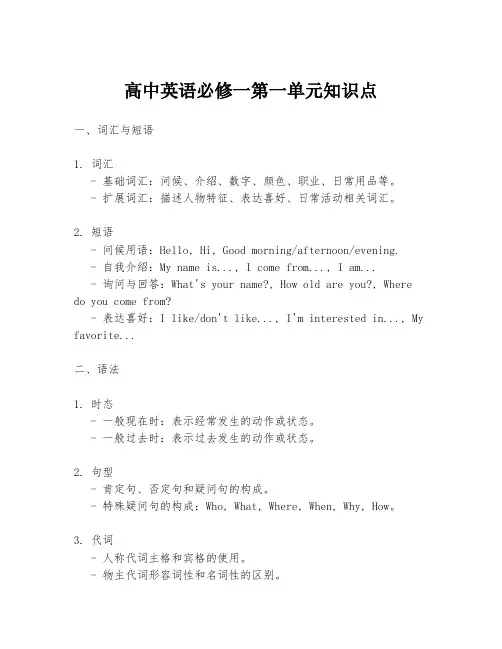
高中英语必修一第一单元知识点一、词汇与短语1. 词汇- 基础词汇:问候、介绍、数字、颜色、职业、日常用品等。
- 扩展词汇:描述人物特征、表达喜好、日常活动相关词汇。
2. 短语- 问候用语:Hello, Hi, Good morning/afternoon/evening.- 自我介绍:My name is..., I come from..., I am...- 询问与回答:What's your name?, How old are you?, Where do you come from?- 表达喜好:I like/don't like..., I'm interested in..., My favorite...二、语法1. 时态- 一般现在时:表示经常发生的动作或状态。
- 一般过去时:表示过去发生的动作或状态。
2. 句型- 肯定句、否定句和疑问句的构成。
- 特殊疑问句的构成:Who, What, Where, When, Why, How。
3. 代词- 人称代词主格和宾格的使用。
- 物主代词形容词性和名词性的区别。
4. 介词- 常用介词:in, on, at, for, with, by, of, about, from, to, from...to...三、听力与口语1. 听力- 理解日常对话和短文。
- 抓住关键信息,如人名、地点、时间和数字。
2. 口语- 进行简单的自我介绍和日常对话。
- 描述人物和事物,表达个人意见和喜好。
四、阅读与写作1. 阅读- 阅读并理解简短的文章和对话。
- 通过上下文猜测生词的意思。
2. 写作- 写简短的自我介绍。
- 描述人物、地点或事件。
五、文化知识1. 了解英语国家的基本文化习俗。
2. 学习与日常生活相关的英语国家节日和传统。
六、学习策略1. 制定学习计划,合理安排学习时间。
2. 利用多种资源和工具辅助学习,如词典、录音和在线资源。
(完整版)人教版高中英语必修一语法知识点总结
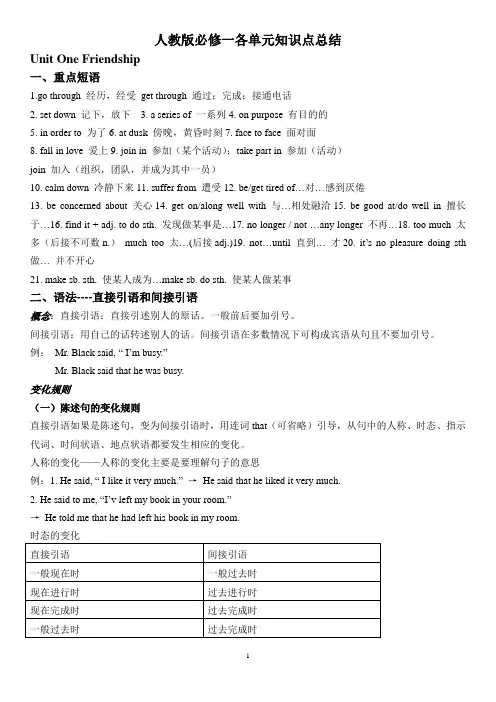
人教版必修一各单元知识点总结Unit One Friendship一、重点短语1.go through 经历,经受get through 通过;完成;接通电话2. set down 记下,放下3. a series of 一系列4. on purpose 有目的的5. in order to 为了6. at dusk 傍晚,黄昏时刻7. face to face 面对面8. fall in love 爱上9. join in 参加(某个活动);take part in 参加(活动)join 加入(组织,团队,并成为其中一员)10. calm down 冷静下来11. suffer from 遭受12. be/get tired of…对…感到厌倦13. be concerned about 关心14. get on/along well with 与…相处融洽15. be good at/do well in 擅长于…16. find it + adj. to do sth. 发现做某事是…17. no longer / not …any longer 不再…18. too much 太多(后接不可数n.)much too 太…(后接adj.)19. not…until 直到…才20. it’s no pleasure doing sth 做…并不开心21. make sb. sth. 使某人成为…make sb. do sth. 使某人做某事二、语法----直接引语和间接引语概念:直接引语:直接引述别人的原话。
一般前后要加引号。
间接引语:用自己的话转述别人的话。
间接引语在多数情况下可构成宾语从句且不要加引号。
例:Mr. Black said, “ I’m busy.”Mr. Black said that he was busy.变化规则(一)陈述句的变化规则直接引语如果是陈述句,变为间接引语时,用连词that(可省略)引导,从句中的人称、时态、指示代词、时间状语、地点状语都要发生相应的变化。
人教版高一英语必修一unit1-3的短语和语法
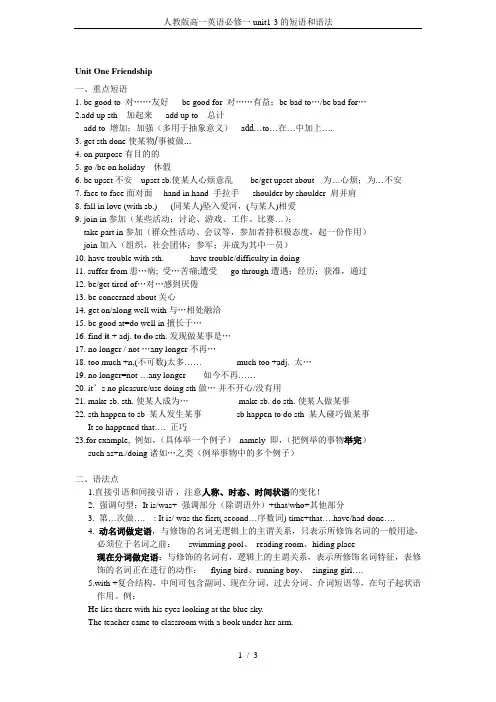
Unit One Friendship一、重点短语1. be good to 对……友好be good for 对……有益;be bad to…/be bad for…2.add up sth 加起来add up to 总计add to 增加;加强(多用于抽象意义)a dd…to…在…中加上….3. get sth done使某物/事被做…4. on purpose 有目的的5. go /be on holiday 休假6. be upset不安upset sb.使某人心烦意乱be/get upset about 为…心烦;为…不安7. face to face 面对面hand in hand 手拉手shoulder by shoulder 肩并肩8. fall in love (with sb.) (同某人)坠入爱河,(与某人)相爱9. join in 参加(某些活动:讨论、游戏、工作、比赛…);take part in 参加(群众性活动、会议等,参加者持积极态度,起一份作用)join 加入(组织,社会团体;参军;并成为其中一员)10. have trouble with sth. have trouble/difficulty in doing11. suffer from 患…病; 受…苦痛;遭受go through遭遇;经历;获准,通过12. be/get tired of…对…感到厌倦13. be concerned about 关心14. get on/along well with 与…相处融洽15. be good at=do well in 擅长于…16. find it + adj. to do sth. 发现做某事是…17. no longer / not …any longer 不再…18. too much +n,(不可数)太多……much too +adj. 太…19. no longer=not …any longer 如今不再……20. it’s no pleasure/use doing sth 做…并不开心/没有用21. make sb. sth. 使某人成为…make sb. do sth. 使某人做某事22. sth happen to sb 某人发生某事sb happen to do sth 某人碰巧做某事It so happened that…. 正巧23.for example, 例如,(具体举一个例子)namely 即,(把例举的事物举完)such as+n./doing诸如…之类(例举事物中的多个例子)二、语法点1.直接引语和间接引语,注意人称、时态、时间状语的变化!2. 强调句型:It is/was+ 强调部分(除谓语外)+that/who+其他部分3. 第…次做…. : It is/ was the fisrt( second…序数词) time+that….have/had done….4. 动名词做定语,与修饰的名词无逻辑上的主谓关系,只表示所修饰名词的一般用途,必须位于名词之前:swimming pool、reading room、hiding place现在分词做定语:与修饰的名词有,逻辑上的主谓关系,表示所修饰名词特征,表修饰的名词正在进行的动作:flying bird、running boy、singing girl….5.with +复合结构,中间可包含副词、现在分词、过去分词、介词短语等,在句子起状语作用。
高一英语必修一知识点归纳
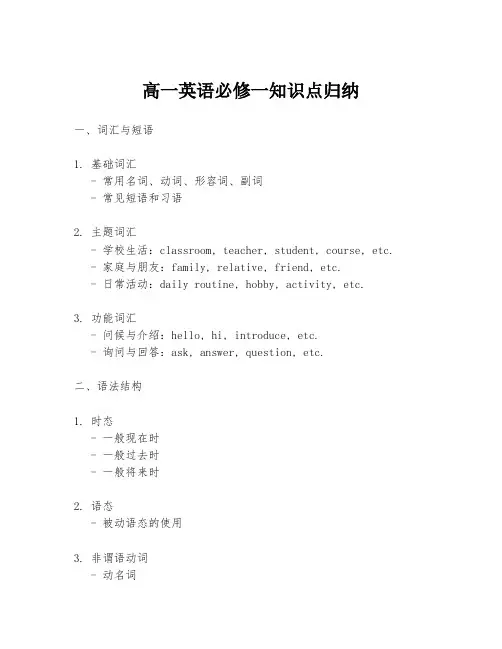
高一英语必修一知识点归纳一、词汇与短语1. 基础词汇- 常用名词、动词、形容词、副词- 常见短语和习语2. 主题词汇- 学校生活:classroom, teacher, student, course, etc. - 家庭与朋友:family, relative, friend, etc.- 日常活动:daily routine, hobby, activity, etc.3. 功能词汇- 问候与介绍:hello, hi, introduce, etc.- 询问与回答:ask, answer, question, etc.二、语法结构1. 时态- 一般现在时- 一般过去时- 一般将来时2. 语态- 被动语态的使用3. 非谓语动词- 动名词- 分词(现在分词和过去分词)4. 句型- 简单句- 并列句- 复合句(定语从句、状语从句等)三、阅读理解1. 阅读技巧- 快速阅读(Skimming)- 精读(Scanning)- 推断与预测2. 文章类型- 记叙文- 议论文- 说明文3. 常见问题类型- 事实细节题- 主旨大意题- 推理判断题四、写作技巧1. 写作格式- 书信- 日记- 议论文2. 写作要点- 明确主题 - 逻辑清晰 - 语言准确3. 写作技巧- 使用连接词 - 段落结构 - 多样句式五、听力技巧1. 听力策略- 预测- 注意力集中 - 关键词捕捉2. 听力材料- 对话- 短文- 讲座3. 听力题型- 信息匹配 - 细节理解 - 推理判断六、口语表达1. 发音- 音标学习- 单词发音- 句子重音和语调2. 日常对话- 问候与告别- 邀请与应答- 请求帮助3. 讨论与演讲- 表达观点- 支持论点- 结束语请注意,以上内容是一个基础框架,您可以根据具体的教学大纲和学生的学习情况进行调整和补充。
在Word文档中,您可以使用标题、子标题、列表和表格等格式化工具来使文档更加清晰和专业。
此外,为了确保文档的可编辑性和可操作性,建议使用清晰和标准的字体,如Times New Roman或Arial,并确保文档的页边距、行距和段落格式符合标准文档的要求。
高一英语必修一语法知识点总结
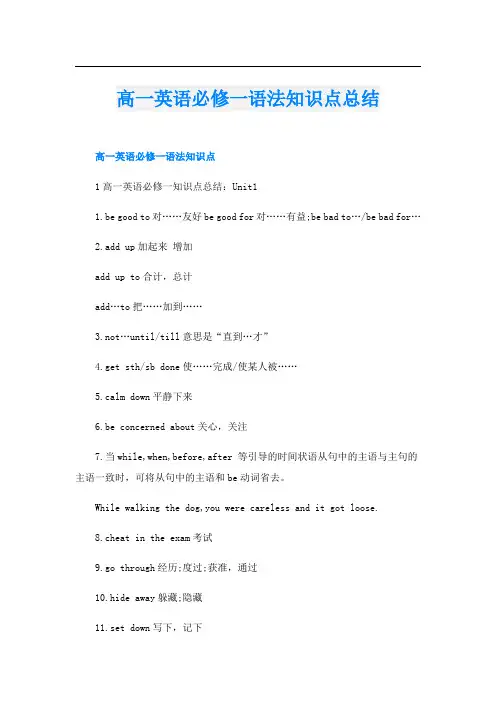
高一英语必修一语法知识点总结高一英语必修一语法知识点1高一英语必修一知识点总结:Unit11.be good to对……友好be good for对……有益;be bad to…/be bad for…2.add up加起来增加add up to合计,总计add…to把……加到……3.not…until/till意思是“直到…才”4.get sth/sb done使……完成/使某人被……5.calm down平静下来6.be concerned about关心,关注7.当while,when,before,after 等引导的时间状语从句中的主语与主句的主语一致时,可将从句中的主语和be动词省去。
While walking the dog,you were careless and it got loose.8.cheat in the exam考试9.go through经历;度过;获准,通过10.hide away躲藏;隐藏11.set down写下,记下12.I wonder if…我不知道是不是…12.on purpose故意13.sth happen to sb某人发生某事sb happen to do sth某人碰巧做某事it so happened that……正巧碰巧14.It is the first(second…)that…(从句谓语动词用现在完成时)15.in one’s power处于……的控制之中16.It’s no pleasure doing…做…没有乐趣It’s no good/use doing sth.做某事是没好处/没用的17.She found it difficult to settle and calm down in the hiding place.it做形式宾语18.suffer from患…病;遭受19.so…that…/such…thay…20.get tired of…对…感到劳累疲惫21.have some trouble with sb/sth.在……上遇到了麻烦22.get along with sb/sth.与某人相处23.ask(sb)for advice.(向某人)征求建议24.make后接复合宾语,宾语补足语须用不带to的不定式、形容词、过去分词、名词等。
人教版高中英语必修一知识点+语法总结(全面)
高一主要语法点人教版必修一各单元知识点总结Unit One Friendship一、重点短语through 经历,经受 get through 通过;完成;接通电话2. set down 记下,放下 3. a series of 一系列4. on purpose 有目的的5. in order to 为了6. at dusk 傍晚,黄昏时刻7. face to face 面对面8. fall in love 爱上9. join in 参加(某个活动); take part in 参加(活动) join 加入(组织,团队,并成为其中一员)10. calm down 冷静下来11. suffer from 遭受12. be/get tired of…对…感到厌倦13. be concerned about 关心14. get on/along well with 与…相处融洽15. be good at/do well in 擅长于…16. find it + adj. to do sth. 发现做某事是…17. no longer / not …any longer 不再…18. too much 太多(后接不可数n.) much too 太…(后接adj.)19. not…until 直到… 才20. it’s no pleasure doing sth 做… 并不开心 21. make sb. sth. 使某人成为… make sb. do sth. 使某人做某事二、语法----直接引语和间接引语概念:直接引语:直接引述别人的原话。
一般前后要加引号。
间接引语:用自己的话转述别人的话。
间接引语在多数情况下可构成宾语从句且不要加引号。
例:Mr. Black said, “ I’m busy.”Mr. Black said that he was busy.变化规则(一)陈述句的变化规则直接引语如果是陈述句,变为间接引语时,用连词that(可省略)引导,从句中的人称、时态、指示代词、时间状语、地点状语都要发生相应的变化。
高一英语必修一unit1_Friendship_重点单词、短语、句型和语法PPT63页
2、要冒一次险!整个生命就是一场冒险。走得最远的人,常是愿意 去做,并愿意去冒险的人。“稳妥”之船,从未能从岸边走远。-戴尔.卡耐基。
梦 境
3、人生就像一杯没有加糖的咖啡,喝起来是苦涩的,回味起来却有 久久不会退去的余香。
高一英语必修一unit1_Friendship_重点 4、守业的最好办法就是不断的发展。 5、当爱不能完美,我宁愿选择无悔,不管来生多么美丽,我不愿失 去今生对你的记忆,我不求天长地久的美景,我只要生生世世的轮 回里有你。 单词、短语、句型和语法
31、只有永远躺在泥坑里的人,才不会再掉进坑里。——黑格尔 32、希望的灯一旦熄灭,生活刹那间变成了一片黑暗。——普列姆昌德 33、希望是人生的乳母。——科策布 34、形成天才的决定因素应该是勤奋。——郭沫若 35、学到很多东西的诀窍
高中英语必修一第一章语法
高中英语必修一第一章语法1. 语法知识概述高中英语必修一第一章是关于语法的基础知识。
语法是语言的骨架,它规定了单词如何组织成句子,以及句子如何组织成段落和篇章。
掌握语法对于研究英语是至关重要的,它可以帮助我们正确地表达思想,避免语义歧义,使我们的语言更加流畅和准确。
2. 句子成分句子是语言的基本单位,了解句子的构成和成分对于理解和使用语法至关重要。
在英语语法中,一个句子通常由主语、谓语和宾语组成。
主语是句子的主要主题,谓语说明主语的动作或状态,宾语是受到动作影响的对象。
例如,"Tom is reading a book" (汤姆正在看书)是一个简单的英语句子。
其中,"Tom"是主语,"is reading"是谓语,"a book"是宾语。
3. 时态和语态时态和语态是英语语法中两个重要的方面。
时态表示动作或状态的时间,主要分为过去、现在和将来三种。
时态的正确使用可以使句子的意思更加清晰和准确。
语态表示动作的主动与被动,可以通过改变动词形式来实现。
被动语态在英语中应用广泛,使用被动语态可以使句子结构更加紧凑,同时也可以强调动作的承受者。
例如,"He has written a letter." (他写了一封信)是一个现在完成时的句子,表示动作发生在过去但与现在有关。
另外,"The book is being read by him." (这本书正在被他阅读)是一个被动语态的句子,强调动作的承受者。
4. 关系从句关系从句是一种修饰句子的从句,它可以提供额外的信息,进一步描述主句中的名词或代词。
关系从句通常由关系代词或关系副词引导。
关系代词有 "who", "whom", "whose", "which" 和 "that";关系副词有 "when", "where" 和 "why"。
外研版 高一英语 必修一 Module1 语法总结
基础学习1.词汇记忆1.1反复阅读,强化记忆(学会使用单词);1.2单词-读音-音标,三者记忆时相辅相成;1.3做好计划,利用零散时间,反复阅读。
Module 1 词汇词组academic [,ækə'dɛmɪk] adj. 学院的,学术的province ['prɒvins] n.省enthusiastic [in,θju:zi'æstik] a.热情的amazed [ə'meizd] adj.惊讶的amazing [ə'meiziŋ] a.令人吃惊的information [,infə'meiʃən] n.信息,通知website [ web’sait] n.网站brilliant ['briljənt] a.(口语)极好的prehension [,kɒmpri'henʃən] n.理解instruction [in'strʌkʃən] n.(常复)指示,说明method ['meθəd] n.方法bored ['bɒ: d] adj.厌倦的embarrassed [im'bærəst] a.尴尬的embarrassing [im'bærəsiŋ] adj.使人尴尬的attitude ['ætitju:d] n.态度behavior [bi'heivjə] n.行为,举止previous ['pri:viəs] a.以前的adv.以前description [di'skripʃən] n.描述technology [tek'nɒlədʒi] n.技术impress [im'pres] vt.给…深刻印象correction [kə'rekʃən] n.改正encouragement [in'kʌridʒmənt] n.鼓励enjoyment [in'dʒɒimənt] n.享受,乐趣fluency ['flu:ənsi] n.流利misunderstanding[,misʌndə'stændiŋ] n.误解disappointed [,disə'pɒintid] adj.失望的disappointing [,disə'pɒintiŋ] adj.令人失望的system ['sistəm] n.系统;制度teenager ['ti:nidʒə] n.青少年disappear [,disə'piə] vi.消失move [mu:v] vt.搬家,移动assistant [ə'sistənt] n.助手cover ['kʌvə] vt.包括 n.盖子diploma [di'pləumə] n.毕业文凭,学位证书重点词组in other words 换句话说look forward to doing sth. 期待;盼望look for 寻找be impressed with 对…印象深刻be different from 与…不同at the start of 在……开始的时候at the end of 在……结束的时候be divided into 被(划)分成……take part in 参加2.语法基础2.1语法入门主语:句子或者句意的主要人物或事物,一般在句首。
- 1、下载文档前请自行甄别文档内容的完整性,平台不提供额外的编辑、内容补充、找答案等附加服务。
- 2、"仅部分预览"的文档,不可在线预览部分如存在完整性等问题,可反馈申请退款(可完整预览的文档不适用该条件!)。
- 3、如文档侵犯您的权益,请联系客服反馈,我们会尽快为您处理(人工客服工作时间:9:00-18:30)。
Unit one Friendship
词汇:
1. add up 合计;把…加起来
eg:Add up 3, 4 and 5 and you'll get 12.把3.4.5加起来得12.
Adding these figures up we can find the answer. 把这些数字加起来,我们就
可以找到答数
add up to 总计达;意味着
eg:The bills add up to exactly $100. 这些帐单加起来正好一百元
These evidence really adds up to that he didn't murder the man.这些证据
实际上意味着他没杀人
2. upset
adj.心烦意乱的,不安的,不适的
eg:She got upset when she heard this news.听到这个消息她感到不安。
There is no point getting upset about it.犯不着为此烦恼.
vt.使不安,使心烦
eg:The news upset him a lot.这个消息让他很不安。
be upset by sth 被某事困扰
upset oneself about sth 对某事感到不安
3. ignore vt. 不理睬;忽视
eg:You will ignore the bell and go somewhere quiet to calm your friend down,
你会不顾上课铃而去一个安静的地方让你的朋友安静下来
ignorant:adj.没有学识的,无知的 ignorance:n.无知
ignore ,neglect,overlook的区别:
ignore:通常指有意不顾或不理会显而易见的事物
neglect:侧重指粗心与疏忽
overlook:指因匆忙而疏忽或视而不见
eg:She saw him coming but she ignored him. 她看见他走过来, 但装做没看到
他
He neglected to make repairs in his house.他忘记了修理房子.
The mother overlooked her little boy's bad behavior.那位母亲忽视了
她的小儿子的不良行为
3. calm vt/vi.(使)平静;(使)镇定 adj:平静的
eg:No one expected that he was so calm when he heard the bad news. 没
人料到他听到这个坏消息还这么平静
Calm yourself. You should not be so excited.请镇静,你不该这么激
动。
calm(…) down (使)平静;(使)镇定
eg:I told myself to calm down. 我告诉自己要冷静。
4. have got to 必须;不得不常可以与have to 互换
eg:Have you got to go now?你非得现在走吗?
5. concern vt. (使)担忧;涉及;关系到 n. 担心;关注;(利害)关系 eg:This discussion concerns your brother.这个讨论与你兄弟有关 There is no concern of mine. 这不关我的事
be concerned about 关心,挂念
be concerned at/over sth 为某事忧虑
be concerned in sth 与…有关;参与;牵涉到
6. go through 详细检查;通过,审查,完成;遭受,经历
eg:The country has gone through too many wars.这个国家经历了太多战争。
The new law did not go through.新法案未能通过。
与go 有关的短语:
go back 回去;回顾 go by 从(…)旁边经过;(时间,机会等)过去 go down 下落,降低 go up 上升,上涨,兴建
go into (1) 到达,进入,从事,参加(2)调查,研究,弄清楚
go in for 参加(考试、比赛等);从事;(3) 爱好,喜欢
go out 1) 出去 2)出国,远行 3)熄灭
go over (1) 复习、温习、演习 2)检查,查看
7. set down 记下;放下;登记
eg:I don’t want to set down a series of facts in a diary as most people
do.我不愿像大多数人那样在日记中记流水账。
与set 有关的短语:
set about 开始;着手 set off 出发, 动身使爆炸, 点燃, 发射使(某人)开始
做, 使发火
set out 出发, 开始;陈述;阐明, 提出(理由) 摆出, 陈列, 布置
set to 认真干起来,大干起来 set up 竖起,建起
8. on purpose 故意(地);有意(地)
purposely (比较正式)故意地
9. in order to do sth 为了做某事可以放在句首,句中;可以与in order that 从句
互换
so as to do sth 为了做某事一般放在句中可以与so that 从句互换
10. face to face 面对面
face-to-face 面对面的
11. no longer=not any longer 不再…
no more=not any more 不再…
二者区别:no longer着重表示时间的不再延续,意为"如今不再"。
no more着重表示数量或程度的减少,意为"再也没有更多(大)的数量(程度)"。
no longer 修饰延续性动词,如teach, live, work等,表示动作不再延续;no more修饰非延续性动词,如come, go , make (the same mistake)等,表示动作不再次发生。
12. settle vi安居,停留 vt.使定居;安排;解决eg:He settled his child in a corner of the compartment.他把孩子安顿在车厢的一个角落里.
The family has settled in Canada.这家人已经在加拿大定居。
phrases: settle down 1)(使)停止讲话,(使)安静下来;2)安顿,定居;3)开始专心于(活动、工作等),着手认真做(某事)[+to] settle for (勉强)接受,(将就着)同意
13. suffer v 遭受,忍受;经历
suffer from 遭受,患病 suffer for 因…而吃苦头
eg:Do you often suffer from headaches?你常头痛吗?
You will suffer for it if you drink up all the beer.如果喝完这所有的啤酒你会因此难受的。
14. get/be tired of 对…厌烦
15. pack up 将…包装
pack away将…收起来
eg:Please pack away the picnic things. 请把野餐用的东西收起来
16. get along/on with 与…相处;进展
get along/on well/nicely/badly with 与…相处得好/不好;进展顺利/不顺利
17. fall in love with sb与…相爱,爱上…
be in love with 与…相爱,爱着…
前者强调动作,后者强调状态
18. disagree vi 不同意
disagree with sth 不同意某事
disagree with sb (…)使某人身体不适,对某人有影响
disagree about/on 对观点不赞同,有分歧
eg:We disagree on that plan.我们对那个计划有分歧
Seafood always disagrees with me.我吃海鲜总不舒服
19. join in 参加;加入(某活动)=take part in
join 参加;加入(群体,政党,组织等)
eg:When did you join the Party? 你什么时候入党的?
May I join you for dinner?我能和你们共进晚餐吗?
Would you like to join in the English contest?你想参加英语竞赛吗?语法:
1.介词with+宾语+宾语补足语。
